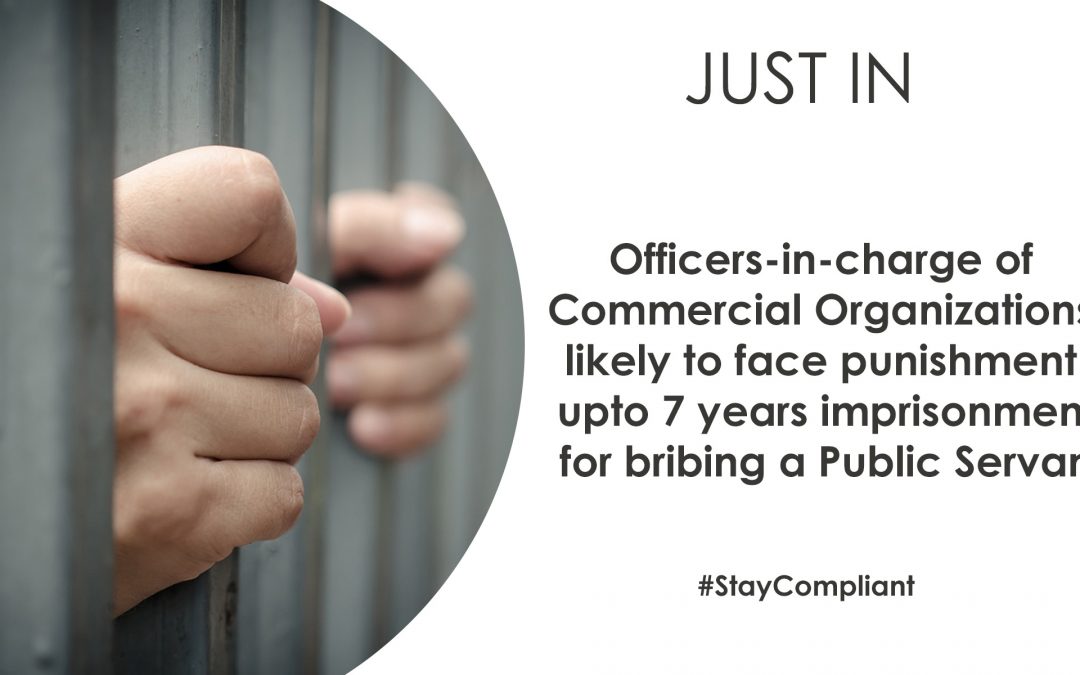The Prevention of Corruption (Amendment) Act, 2018 (Amendment) gains effect since 26th July, 2018. (Please click here for the commencement notification).
This Amendment seeks to amend various provisions of the Prevention of Corruption Act, 1988 (“Act”).
Key Highlights of the Amendment:
Bribery, a cognizable offence: The Amendment recognizes the act of giving bribe as a direct cognizable offence. However, a person who is compelled to give a bribe will not be charged with the offence if he reports the matter to law enforcement authorities within seven days. Punishment for both bribe givers and takers has been enhanced.
Definition of ‘Undue Advantage’ expanded: It is interesting to note that the revised definition of the word “Undue Advantage” broadens the ambit of the term bribe. This newly added definition will help overcome the difficulties associated with understanding the term bribe. As a part of the definition of the word “Undue Advantage”, the words i.e. “Gratification” and “Legal Remuneration” has also been explained to clarify the term bribe. The legislature has not limited the ambit of gratification only to pecuniary gratifications or to gratifications estimable in money but has kept it wide for the purpose of broader interpretation. On the other hand, the ambit of “Legal Remuneration” has not been restricted to the remuneration paid to a public servant but includes all remuneration which he is permitted by the Government or the organization, which he serves, to receive.
Specific Provisions enacted, making bribery an offence: Under the Act, there is no specific provision for offence/s relating to bribing a public servant. The Amendment brings in a specific provisions to penalize offence/s relating to bribing a public servant. The Amendment recognizes the Offering or giving an undue advantage to another person, intending to: i) induce, or ii) reward, the public official to perform his public duty improperly; or Offering an undue advantage to a public official, knowing that such acceptance would qualify as performing his public duty improperly as an offence.
Corporate bribery criminalized: Commercial organizations have been brought under the ambit of this Act by bringing in a specific provision to penalize commercial organization who bribe a public servant. Section 9 has been introduced to cover a commercial organization’s liability, making the offence cognizable under the Code of Criminal Procedure, 1973. As per Section 9, “A commercial organization shall be guilty of an offence and shall be punishable with fine, if any person associated with the commercial organization offers, promises or gives a financial or other advantage to a public servant intending:
(a) to obtain or retain business for such commercial organization; and
(b) to obtain or retain an advantage in the conduct of business for such commercial organization:”
Commercial organization will be held guilty of an offence with respect to bribing public servants if any person connected with the commercial organization offers, promises or gives financial or any other advantages to any public servant directly or through third party with a view to obtain or retain business for such commercial organization or to obtain or retain advantages of doing/conducting business of such commercial organization.
Corporate organizations to have adequate procedures in place to prevent persons associated with it from indulging in corrupt practices: The onus to defend allegation of corrupt practices lies with the commercial organization. The commercial organizations have to prove that the organization had taken enough precautions to prevent persons associated with it from indulging in corrupt practices. In effect, corporate organizations will need to have adequate procedures in place to prevent persons associated with it from undertaking such conduct. The Central Government is likely to come out with Guidelines for commercial organizations to follow in order to prevent persons associated with them from bribing any person, being a public servant.
Officers- in- charge of commercial organization to be guilty of offence: Where an offence under section 9 is committed by a commercial organisation, and such offence is proved in the court to have been committed with the consent or connivance of any director, manager, secretary or other officer of the commercial organisation, such director, manager, secretary or other officer shall be guilty of the offence and shall be liable to be proceeded against and shall be punishable with imprisonment for a term which shall not be less than three years but which may extend to seven years and shall also be liable to fine.
As per the Act, a “commercial organization” means:
(i) a body which is incorporated in India and which carries on a business, whether in India or outside India;
(ii) any other body which is incorporated outside India and which carries on a business, or part of a business, in any part of India;
(iii) a partnership firm or any association of persons formed in India and which carries on a business (whether in India or outside India); or (iv) any other partnership or association of persons which is formed outside India and which carries on a business, or part of a business, in any part of India;





